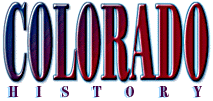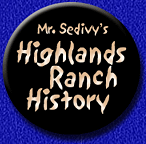|
|


Mr. Sedivy's
History Classes:









More Features:


 

 

|
|
Highlands Ranch High School - Mr. Sedivy
Highlands Ranch, Colorado

- Colorado History -
Colorado
History Syllabus
Nine (9) week block schedule - Elective
Prerequisites:
One year American History course work or permission of instructor.
Brief Course Description:
The student will have a basic familiarity with the events and individuals
significant in the occupation and development of Colorado, 1800 -
1900.
In addition to classroom work, quizzes, and
exams, students will complete the two following requirements:
1. The
student will select one book from a reading list and submit a critical
review.
2. The student will master a portion
of the course material in more depth through research and completion
of an eight to ten page narrative term paper, thoroughly documented.
Additionally, this course will meet Social
Studies Standards in the following:
Geography:
Place, location, human impact, culture, populations, trends, political,
economic, natural resources and spatial behavior.
History:
Cause and effect, problem solving, cultural diversity, state and local
government, politics, economic impact, United States military, immigration,
technology, transportation, American Civil War, leadership, law, crime
and courts, and agriculture.
 The majority of material will come from lecture, journal articles,
Colorado Magazine, The Westerners Brand, and Western Round Up and
various other sources deemed valuable by instructor. Copies of the
above will be supplied to students.
The majority of material will come from lecture, journal articles,
Colorado Magazine, The Westerners Brand, and Western Round Up and
various other sources deemed valuable by instructor. Copies of the
above will be supplied to students.
 Optional textbook: Ubbelohde, A Colorado History, Sixth Edition; Pruett
Publishing, Boulder, CO: 1988. 421 pages. $18.95.
Optional textbook: Ubbelohde, A Colorado History, Sixth Edition; Pruett
Publishing, Boulder, CO: 1988. 421 pages. $18.95.
Objectives
By Topic
The Geographic Setting
Students will learn the three general regions of the state, the
origin of the name "Rocky Mountains," the major rivers of
the state and the areas and their sources, the early nineteenth century
attitudes towards the state's topography and the relative length of
the north and south boundary.
Students will be familiar with the geographic
locations of the following sites:
Great Plains, Arkansas River, South Platte River, Smoky Hill River,
Republican River, Fountain Creek, Cherry Creek, Sand Creek, and Purgatory
River; Rocky Mountains, North Park, North Platte River, Middle Park,
Colorado (Grand) River, South Park or Bayou Salado, South Platte and
Arkansas Rivers, San Luis Valley, Rio Grande River and Clear Creek
and Cache La Poudre River; Mesa-Plateau or Western Slope, San Juan
Mountains and Brown's Hole.
Terms to recognize and identify:
Great American Desert, Mount Elbert, Montagnes Rocheuses, and Raton
Pass.
The Americans Appear 1800-1820
Students will know how the United States first acquired part of
Colorado and the boundry dispute and settlement which resulted. Students
will be familiar with the objectives, routes and results of the Pike
and Long expeditions.
Terms to recognize and identify:
Louisiana, Lieutenant Zebulon Pike, General James Wilkinson, Adams-Onis
Treaty, Major Stephen H. Long, Dr. Edwin James, and 'Great American
Desert'.
The Mountain Men
Students will have a general knowledge of the Colorado Fur industry
and the men involved.
Terms to recognize and identify:
James Purcell, Glenn-Fowler Party, 'Free-Trappers,' Origin of the
Cache-la Poudre, Kit Carson, John C. Fremont, 'Peg Leg' Smith, Bill
Williams, James Baker, Jim Bridger, and James P. Beckwourth.
Force, Commerce, and Competition
Students will be able to discuss Bent's Fort, its location, ownership,
construction, customers, trade products, employees and fate. Students
will be able to discuss the trade on the South Platte.
Terms to recognize and identify:
William Becknell, Santa Fe Trail, Charles Bent, William Bent, Ceran
St. Vrain, Gantt and Blackwell, Fort Cass, Fort Williams, Bents' Fort,
Cimarron Cutoff, Murray, Old Juan, Dick and Andrew Green, Fort Vasquez,
Fort Lupton, Fort Jackson, Fort St. Vrain, Fort Uncompahgre, Fort
Davy Crockett, Fort Pueblo, and New Bents' Fort.
The Indians
The Arapahoe, Cheyenne, and Utes
Students will be aware of the territory, general cultural characteristics,
and how and why these three tribes came to Colorado.
Terms to recognize and identify:
Shoshonean, Algonquin, Sioux-Lakaota, Arapahoe, Pawnee, 'Cut Arms,'
Sun Dance, Dog Soldier Society, Sacred Arrows, 'Buffalo Hat,"
and 'Tatooed Breasts'.
Military Expeditions - Exploration and
Conquest of the 1840's
Students will be familiar with the circumstances of Fremont's
Expeditions and with American acquisition of the remainder of Colorado
in the Mexican War.
Terms to recognize and identify:
John C. Freemont, Kit Carson, 'The Pathfinder of the West,' William
Gilpin, American- Mexican War, Colonel Stephen W. Kearney, Taos Rebellion,
Treaty of Guadalupe- Hidalfo, Bill Williams, and Captain John Gunnison.
Utes, Anglos and Hispanos, 1846-1857
Students will be familiar with the first permanent settlements
and the resulting Ute War.
Terms to recognize and identify:
William Gilpin, Kit Carson, San Luis Valley, Las Animas Grant, San
Luis, Conejos Land Grant, Fort Garland, Fort Pueblo Massacre, Colonel
Thomas Fauntleroy, Battle of Poncha Pass, Captain Randolph Marcy.
Early Gold and the Year 1858
Students will be familiar with reports of gold in Colorado prior to
1858. Students will know and be able to describe the events and individuals
concerned with the gold discoveries and towns founded in 1858.
Terms to recognize and identify:
John Beck, William Greenberry Russell, Auraria, Fall Leaf Lawrence
Party, Julia Holmes, St. Charles, William Larimer, Leavenworth Party,
Arapahoe County Kansas Territory, Denver City.
The Rush of '59
Students will know the causes, routes, means of travel and hardships
of the 1859 Gold Rush.
Terms to recognize and identify:
Pikes Peak, California Gold rush, National Depression, Commersial
Promotion by Missouri River Towns, Guide Books, William Byers, Greed
and Gullibility, South Platte, Republican, Arkansas (Santa Fe) and
Smoky Hill (Smoky Hell) Routes, Sam Peppard, the Blue Brothers and
Soleg and Go-Backs.
Prospecting In Pikes Peak, 1859
Students will be familar with the first three significant gold discoveries
of 1859.
Terms to recognize and identify:
George Jackson, Clear Creek South Branch, Jackson Diggings, Idaho
Springs, Red Rock Camp, Deadwood Diggings, John H. Gregory, Clear
Creek North Branch, Dave Wall, Gregory District, Black Hawk, Central
City, Nevada City, and Horace Greeley.
The Boom Continues, 1859-61
Students will be familiar with the extents and limits of gold exploration
during the Pikes Peak Rush and its effect on Indian relations.
Terms to recognize and identify:
James Reynolds, Abe Lee, California Gulch, Charles Baker, San Juans,
Auraria - Denver City, Golden, Colorado City, Canon City and Trinidad,
Left Hand, William Byers, William Bent, Albert Boone, Fort Wise Treaty,
Little Raven, Black Kettle, White Antelope, and Lean Bear.
The Creation of Colorado Territory
Students will be familiar with the political entities of which Colorado
was once a part and the development which led to the creation of Colorado
as a federal territory.
Terms to recognize and identify:
Utah Territory, New Mexico Territory, Kansas Territory, Nebrask Territory,
Colona Territory, Jefferson Territory, Beverly Williams, Idaho Territory,
Tahosa Territory, President James Buchanan, William Gilpin, President
Abe Lincoln, Hiram Bennet, Colorado City.
The Civil War in Colorado Territory
Students will know the role of Colorado in the Civil War with special
attention to the history of the First Colorado Volunteer Regiment
and the guerilla warfare.
Terms to recognize and identify:
Fort Garland, Fort Wise, Fort Lyon, Colonel John Heffinger, Mace's
Hole, Colonel Edwin Canby, First Colorado Volunteer Regiment, Colonel
John Slough, Lt. Col. Samuel Tappan, Capt. Jim Fords' Company, Capt.
Dodds' Company, Fort Weld, 'Pet Lambs,' Maj. John Chivington, $375,000
Warrants, Governor Gilpin, Maj. Henry Sibley, Battle of Valverde,
Fort Union, Apache Canyon, Battle of Pigeons Ranch, Battle of La Glorietta,
'Gettysburg of the West,' Governor John Evans, Second Colorado Volunteer
Regiment, Madison or Mattison and James Reynolds.
War on the Plains, January - November, 1864
Students will be able to discuss fully the chain of events commencing
in April, 1864 which led directly to the attack on Sand Creek.
Terms to recognize and identify:
General Samuel Curtis, Colonel William Collins, Colonel John Chivington,
Lt. George Eayre, Lt. Clark Dunn, Freemont's Orchard Battle, Major
Jacob Downing, Cedar Canyon, Lean Bear, Left Hand, Fort Larned, Major
Ned Wynkoop, Captain Eugene Ware, George Bent, Charley Bent, Hungate
Massacre, Evans' Proclamation, Fort Collins, 'Appeal To The People,'
Jack Smith, 'On the Prairie,' Elbridge Gerry, One-Eye, Black Kettle,
Fort Weld Conference, Bull Bear, Julesburg, Camp Rankin - Fort Sedgwick,
Third Colorado Volunteers, and Colonel George Shoup.
Sand Creek
Students will be able to describe the general details of the campaign
of the Third Colorado Volunteers.
Terms to recognize and identify:
Little Raven, Ned Wynkoop, Scott Anthony, Fort Lyon, Black Kettle,
Left Hand, Third Colorado Volunteers, John Chivington, James Beckwourth,
Robert Bent, and Captain Silas Soule.
The Investigations, 1865
Students will be able to discuss and evaluate the various issues,
charges and findings of the the official investigations of Sand Creek.
Students, in their discussions and evaluations, will indicate a familiarity
with the terms and names already introduced such as: Black Kettle,
Chivington, Soule, Anthony, John and Jack Smith, Wynkoop, and the
Bent Brothers.
Mining and the Mining Camps
Students will be familiar with the process wherby an outcrop of ore
generated a booming community and the phases which eventually reduce
the community to an abandoned 'Ghost Town'.
Terms to recognize and identify:
Vein or Lode, Blossom Rock, Float, Placer Deposit, Prospectors, Placer
Mining, Hard-Rock Mining, Cornwall, 'Cousin Jacks,' Welch from Wales,
Muckers, Tommy-Knockers, and High-Grading.
Mining in the 1860's
Students will be familiar with the career of Pat Casey and the
manner in which the Rebellious Ore Crisis was resolved.
Terms to recognize and identify:
Pat Casey, 'Night Hands,' Rebellious Ore Crisis, Nathanial Hill, Wales,
Black Hawk, Clara Brown, Henry Teller, and Caribou District.
1860's Miscellanies
Students will be able to recognize and identify the following terms:
Alexander Cassiday, Jon B. Stetson and J.W. Powell.
The Silver Seventies
Students will know the general developments of the Colorado mining
industry from 1870 until 1880 with particular attention to the discovery
of the new districts and the emergence of silver as 'King'. Students
will be familiar with certain individuals of the period.
Terms to recognize and identify:
San Juans, 'American Alps,' Del Norte, Otto Mears, 'The Pathfinder
of the San Juans,' Billy Stevens and Alvinius Wood, Horace Austin
Warner Tabor, Leadville, Barney Ford, John Campion, Little Jonny Mine,
'Leadville Johnny,' James J. Brown and Molly.
The Silver King
Students will be familiar with the events and personalities of the
Tabor saga.
Terms to recognze and identify:
H.A.W. Tabor, Augusta, Little Pittsburgh, Matchless Mine, Elizabeth
McCourt, Baby Doe, Tabor Grand Opera House, Senator Teller, and the
'Crash of '93'.
The Struggle for Statehood, 1861-1876
Students will be familiar with the series of events which eventually
resulted in statehood and will be aware of the forces, issues and
individuals concerned in the delays.
Terms to recognize and identify:
Enabling Act, Constituent Convention, State Constitution, Attempt
of 1864, Denver Crowd, John Evans, David Moffat, John Chivington,
Jerome Chaffee, William Byers, Henry Teller, Golden Crowd, William
Loveland, Attempt of 1865, President Andrew Johnson, Governor Alexander
Cummings, Governor Edward McCook, Tom Patterson, Governor John Routt,
President U.S. Grant, 1 August 1876, and Casimior Barela.
Colorado's Pioneer Transportation
Students will be familiar with the building of the railroad system
throughout Colorado with special attention to particular lines and
promoters.
Terms to recognize and identify:
Russell, Majors and Waddell, Ben Hollady, Wells Fargo and Company,
Union Pacific R.R., William Loveland, Colorado Central R.R., General
Grenville Dodge, South Pass Route, Denver - Pacific R.R., Cheyenne,
Kansas-Pacific R.R., William Jackson Palmer, Denver and Rio Grande
R.R., Colorado Springs, 'Little London,' Atchison Topeka and Santa
Fe R.R., Denver South Park and Pacific, Raton Pass, 'Uncle Dick' Wooton,
Royal Gorge War, Georgetown Loop, Race to Leadville, Otto Mears, and
George Pullman.
Mining Camp Amusements
Students will have a general awareness of the types of recreation
common to the mining camps.
Terms to identify and recognize:
Liquor, Taos Lightning, Gambling, Faro, Monte, Sundays, Christmas,
Fourth of July, Hose Company Races, Hook and Ladder Races, Hard-Rock
Drilling Contests, Hotel de Paris, Georgetown, Louis Dupuy, Oscar
Wilde, Festival of Mountain and Plain, and Ice Palace.
Pioneer Prostitution
Students will a general knowledge of the prevelance of prostitution
and will be acquainted with some of the more notorious participants.
Terms to recognize and identify:
Four Municipal Policies, the Row or the Line, 'Hog Ranches,' Cribs,
Parlor Houses, Creepers, Hook-Artists, Panel-Workers, Silver Heels,
and Laura Evans.
Frontier Humor and Entertainment
Students will be generally aware of the themes and means which afforded
laughter in early Colorado.
Terms to recognize and identify: John Timothy
O'Keefe, David Day, Solid Muldoon, Jacob Coors, and Jack Dempsey.
Conflicts, Chinese and Creede
Students will be aware of the frequency of disastrous fires in the
early settlements, of the racist discrimination exercised against
"Orientals," and of the founding and failure of Creede.
Terms to recognize and identify:
Central City, Nick Creed, David Moffat, Bob Ford, and 'Soapy' Smith.
Cripple Creek
Students wil be familiar with the events and individuals involved
in the founding and development of the Cripple Creek District and
with some of the significant or colorful experiences and adventures
which characterized the District.
Terms to recognize and identify:
Weltys, Mount Pisgah, Bob Womack, Poverty Gulch, Count Pourtalis,
Bennet and Meyers, Julian Street, Victor, Joe Wolf, and Gillet.
Winfield Scott Stratton
Students will be familiar with the career of Winfield Scott Stratton.
Terms to recognize and identify:
Winfield Scott Stratton, Battle Mountain, Independence Mine, Portland
Mine, Myron Stratton Home, Thomas Walsh, Camp Bird Mine, and Hope
Diamond.
Crime and Courts in Colorado
Students will know the general procedures of establishing law and
order on the frontier. Students will be familiar with certain individuals,
criminals - or law men, who have characterized Colorado History.
Terms to recognize and identify:
Horsewhipping, Banishment, Hanging, Vigilantes, 'Hundred and Five,'
Billy Cozens, Jack Slade, Jules Beni, Espinosas, Tom Tobin, Alfred
Packer, Polly Pry, Fred Bonfils, Harry Tammen, and the Sells-Floto
Circus.
Colorado Agriculture
Students will be familiar with development of agriculture in Colorado.
Terms to recognize and identify:
San Luis Valley, David Wall, Rufus Clark, Horace Greeley, Union Colony,
Nathan Meeker, George Swink, Richard Little, Rough and Ready Flour
Mill, Dustbowl, and Big Thompson Project.
Back to the top of page
- Colorado History In Depth
-
Lecture Notes, Reading, and Information:
| The Cheyenne Migration
to Colorado |
| The Gratlan Affair, Massacre, Fort Laramie
Treaty |
The Cheyenne Social Club
| A Cheyenne War Story: Wolf Road, the Runner
|
| Cheyenne Traditions and Beliefs, Sacred
Stories |
| Horses, Warriors, War Pipe, Sweatlodge
Ceremony |
| Cheyenne War Parties and Battle Tactics
|
| The Scalp Dance and Other Cheyenne Dances
|
Fort Union
| The Sante Fe Trail and Fort Union |
| Sumner - Ninth Military Department / The
First Fort Union |
| Early Arrivals to Fort Union, Daily Life
at Fort Union |
| Captain Grover - The New Fort Union, the
Confederate Threat |
| Fort Union Arsenal, William Shoemaker,
End of Fort Union |
Americans from the East
| Thomas Jefferson, the Louisiana Purchase
|
| The Expedition of Zebulon Pike |
| Pikes Peak or Bust / Colorado Gold Rush
|
Colorado's Role in the US Civil
War
| The Civil War, Fort Wise / Fort Lyon
|
| Mace's Hole, Colonel Canby, F.C.V.R.
| Fort Weld |
| The Pet Lambs, John Chivington |
| General Henry Sibly, Battle of Valverde,
Fort Union |
Cripple Creek District Labor Strikes
| The Western Federation of Miners / State
Militia |
| The 1893 - 1894 Strike | The
Strike of 1903 - 1904 |
| The Mine Owners Association |
| Crimes and Military Rule in the Cripple
Creek District |
| Marshall Law in Cripple Creek District
/ End of the Strike |
Early Cripple Creek District
| Photos, Fire, and Life in Cripple Creek
|
| Other Colorful Towns in the Cripple Creek
District:
Gillett - Colorado's Only Bullfight, Victor, Independence |
| A Guide to the Miners' Gritty Lingo
|
More Colorado History
Information
| Bent's Fort Photos, Personalities, Plans,
and More |
| What Was Easter Like at Bent's Fort?
|
| Colorado Trivia,
Miscellaneous Old Photos,
Western Personalities, Forts, and More |
| Lullabies for Jittery Cows - Cowboy Ballads
|
| Heraldry of the Branding Iron |
| Project
Aims to Clear Infamous Cannibal, Alferd Packer |
| Lead Gives Alferd
Packer's Story More Weight |
| Legendary
Colorado Love Stories: Baby Doe Tabor & More
|
| Colorado Pioneer Women: Elizabeth Byers
|
| Early Denver Jokes / The History of April
Fools' Day |
Colorado History Book Review Info
| Colorado History Book Review
List |
Sample Critical Book Reviews
| Bent | Summit
|
Colorado History Research Activity
| Sand Creek |
Colorado Geography Activities /
Worksheets
| Colorado Map Activity | Mountain
Passes | Mining Camps |
| Mineral Names | Fun
Names | Indian Names | Spanish
Names |
Relevant Colorado History Movies
- Viewer Worksheets
| Pueblo Cliff Dwellers | Little
Big Man |
| A Man Called Horse | Jeremiah
Johnson |
Back to the top of page
Cool Clicks & Related
Links
See Mr. Sedivy's History
Links for tons of Colorado History Links
|
|
|



![]() 9375 South Cresthill Lane
9375 South Cresthill Lane ![]() Highlands Ranch, Colorado 80126
Highlands Ranch, Colorado 80126 ![]() 303-471-7000
303-471-7000
